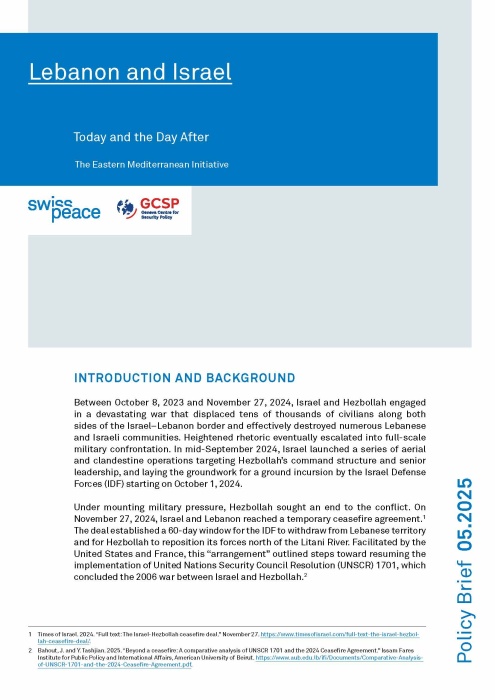Lebanon and Israel Today and the Day After
Developed in the context of the Eastern Mediterranean Initiative, this Policy Brief examines the aftermath of the 2023–2024 Israel–Hezbollah war and the window of opportunity it has opened for a fundamental shift in Israel–Lebanon relations. It outlines urgent short-term priorities, including the full implementation of the ceasefire and support for Lebanese state sovereignty. In the medium term, it highlights the need for credible reconstruction in southern Lebanon, resolution of border disputes, and political reform to strengthen Lebanese institutions. Looking ahead, the brief argues that a durable peace between the two countries is possible—provided that both sides, with international backing, invest in a long-term process that addresses core grievances, fosters mutual recognition, and builds the foundation for eventual normalization.
Introduction and Background
Between October 8, 2023 and November 27, 2024, Israel and Hezbollah engaged in a devastating war that displaced tens of thousands of civilians along both sides of the Israel–Lebanon border and effectively destroyed numerous Lebanese and Israeli communities. Heightened rhetoric eventually escalated into full-scale military confrontation. In mid-September 2024, Israel launched a series of aerial and clandestine operations targeting Hezbollah’s command structure and senior leadership, and laying the groundwork for a ground incursion by the Israel Defense Forces (IDF) starting on October 1, 2024.
Under mounting military pressure, Hezbollah sought an end to the conflict. On November 27, 2024, Israel and Lebanon reached a temporary ceasefire agreement.1 The deal established a 60-day window for the IDF to withdraw from Lebanese territory and for Hezbollah to reposition its forces north of the Litani River. Facilitated by the United States and France, this “arrangement” outlined steps toward resuming the implementation of United Nations Security Council Resolution (UNSCR) 1701, which concluded the 2006 war between Israel and Hezbollah.
Disclaimer: This publication was originally published on SwissPeace. The views, information and opinions expressed in this publication are the author’s/authors’ own and do not necessarily reflect those of the GCSP or the members of its Foundation Council. The GCSP is not responsible for the accuracy of the information.

